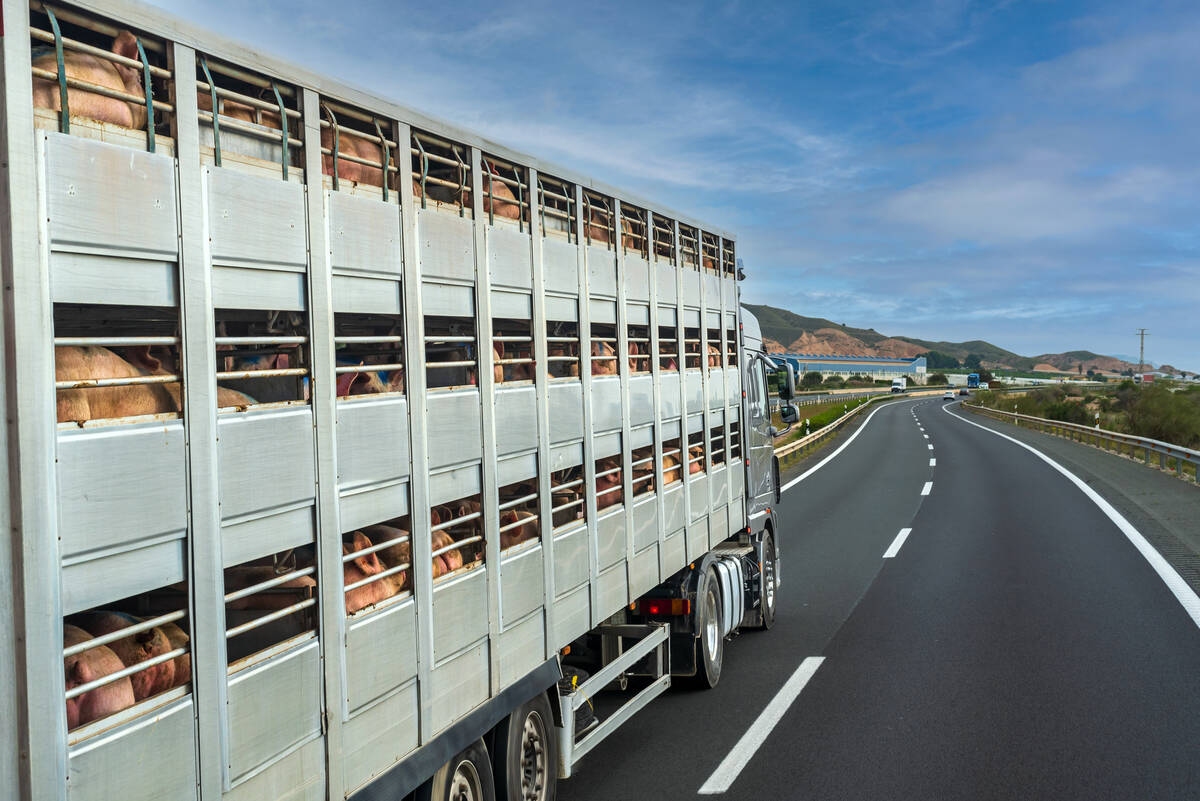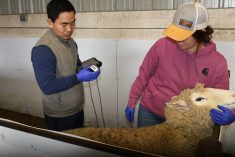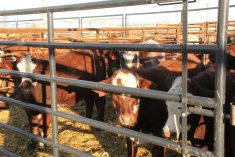As details of the provincial livestock growth strategy begin to trickle out, the industry says it likes what it sees.
The strategy was unveiled earlier this month along with the 2017-18 provincial budget but at that time there were few details forthcoming.
Now producers are finding out it will include ongoing red tape reduction and will maintain the Livestock Associations Loan Guarantee borrowing limits announced with the budget. The program, which allows individuals to borrow up to $500,000, and associations up to $8 million, has also been made permanent, Agriculture Minister Ralph Eichler said.
Read Also

Pig transport stress costs pork sector
Popular livestock trailer designs also increase pig stress during transportation, hitting at meat quality, animal welfare and farm profit, Agriculture and Agri-Food Canada researcher says
- Read more: New investments make provincial budget good for agriculture, says KAP
- Read more: Provincial budget makes no cuts to municipal funding
“That will allow us to actually help the beef producers increase their numbers,” Eichler said.
Brian Lemon, general manager of the Manitoba Beef Producers, said the loan guarantee program is needed to support new producers, a necessary step to growing cattle numbers in Manitoba.
Last year, Eichler vowed to restore Manitoba’s cattle herd from 485,000 to 750,000, numbers not seen since the BSE crisis in the early 2000s.
“If we’re going to grow the herd, we need to grow producers, so anything we can do to help producers make sure that they have access to capital, those are going to be key to be able to grow the herd,” Lemon said.
Lemon says Manitoba Beef Producers is still looking for more details on the livestock growth strategy, although it hopes to see support for current projects, such as the Manitoba Beef and Forage Initiative research farm near Brandon.
Lemon also targeted access to Crown lands and community pastures.
“One of the keys to growing the herd is trying to make sure that we have acres to put the herd on,” he said.
Manitoba Beef Producers has previously raised concern about profitability and market access.
“We all recognize that growing the herd without a market is just a recipe for disaster,” Lemon said. “This needs to be a value chain approach and we need to make sure that the environment is right, not just for the cow-calf guys, but for the backgrounders and the feedlots and (ensuring) that the markets are there for the folks who are selling the beef.”
Trade troubles?
Eichler also noted the province is a strong supporter of increased beef trade, particularly through the upcoming EU trade deal.
The Comprehensive Economic and Trade Agreement (CETA) between Canada and the European Union is currently in committee before the Canadian senate.
The deal includes 65,000 tonnes in duty-free beef and veal exports per year, to be phased in over six years. Exports are required to meet European stipulations against added growth hormones.
Eichler also said the government is looking to CETA to remove some of the sting, should Manitoba beef be negatively impacted by a sudden NAFTA renegotiation, a prospect increasingly raised by the United States.
Manitoba livestock industries are on the watch for both potential NAFTA changes and incoming carbon pricing.
“I’m not really overly concerned about the conversation with NAFTA,” Eichler said. “If anything, Canada has a deficit in regards to trade with the U.S., so I don’t see those as major hurdles. Trade’s all about balance. It’s got to be good for both partners, so I’m not afraid of that conversation.”
Lemon said it is difficult to gauge what a NAFTA renegotiation might mean to his industry, although he pointed to the Canadian beef sector’s previous dispute with the U.S. on country-of-origin labelling laws. The World Trade Organization ruled in Canada’s favour four times before the regulations were repealed in December 2015.
“We’ve got that in our back pocket, that we won that, so if the U.S. is looking at those sorts of issues, we’ve got strategies, I think, whereas a national industry we would be opposed to those sorts of moves,” Lemon said. “In terms of NAFTA, I think we’re still hearing lots of conjecture and rumours and tweets, I guess, from the president. Until you sit down at the table, I think there’s opportunities in NAFTA for the industry.”
In terms of carbon, Manitoba Beef Producers released a carbon pricing policy in March 2017, stressing the industry’s potential for carbon sequestration and calling for carbon tax exemptions, increased research and encouraging producers to maintain or increase pasture and forage land.
“We believe that we’ve got a really positive story to tell in terms of the contributions the cattle industry can make in Manitoba towards being able to achieve its climate change strategy,” Lemon said. “I think having a good, healthy, cow-calf industry in Manitoba is going to be absolutely critical and is one of things that I think the province needs to look at if it expects to reach its climate change goals.”
The province is currently putting together its climate framework and has heard input from the Manitoba Beef Producers, Eichler said.
Looking past beef
Mike Teillet, manager of sustainable development with the Manitoba Pork Council, said his organization generally welcomed the budget.
“I think it’s nice that the budget actually mentions agriculture and actually mentions livestock,” he said. “I can’t remember the last time a budget actually went out of its way to talk about the good things related to livestock.”
The Manitoba Pork Council has been in regular contact with Manitoba Agriculture regarding the livestock growth strategy.
Changes to manure and mortalities regulations have been proposed to grow livestock in Manitoba, the province says. Changes would eliminate the requirement for new or expanding pork operations to treat manure with anaerobic digestion.
Teillet added MPC was pleased to see streamlined foreign worker processing and labour market strategy changes included in the budget.
“Since our industry depends on a number of foreign workers for both the plants and the barns, we believe this is a very positive thing,” he said.
Offsetting the strategy announcement was the loss of certain tax credits, including the nutrient management tax credit for manure treatment or storage equipment, and odour control tax credit for equipment used to reduce odours from organic waste.
While both nutrient management and odour control are of historic concern to Manitoba’s pork industry, both government and the Manitoba Pork Council have said there was little uptake on either tax credit.
“There were issues in accessing them and they weren’t used very much, if at all,” Teillet said.
“It just made sense for programs that are not being taken advantage of to be taken off the list,” Eichler said.




















